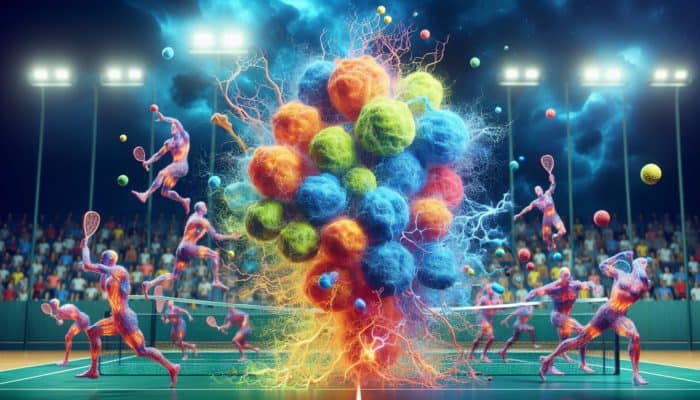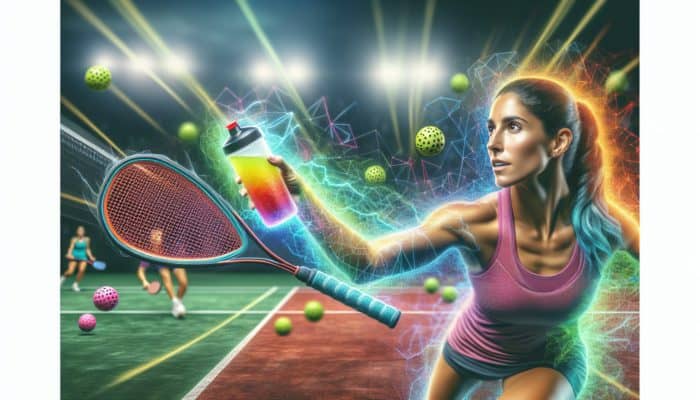Enhance Your Pickleball Game by Mastering Electrolyte Essentials
Discover the Critical Role of Electrolytes in Athletic Performance

Electrolytes are vital minerals that gain an electric charge when dissolved in bodily fluids, significantly influencing numerous physiological processes such as hydration, nerve signaling, and muscle contractions. For athletes participating in the high-energy sport of pickleball, maintaining an optimal balance of electrolytes is crucial for unlocking peak performance capabilities. The primary electrolytes typically found in sports drinks include:
These essential minerals are naturally found in a variety of foods and beverages; however, their levels can significantly diminish during rigorous activities such as pickleball matches. Therefore, understanding how to manage electrolyte intake is critical for athletes striving to maintain energy levels and enhance their game performance effectively.
Identifying the Detrimental Effects of Electrolyte Imbalance in Pickleball
In the fast-paced, high-intensity rallies that characterise pickleball, players often experience considerable sweating, resulting in the loss of essential electrolytes. This depletion can severely impact performance, leading to symptoms such as fatigue, reduced coordination, and painful muscle cramps. To counteract these adverse effects, replenishing electrolytes is essential for sustaining optimal performance throughout the game. Common signs of an electrolyte imbalance may include:
- Muscle cramps
- Fatigue and weakness
- Nausea and dizziness
- Headaches
- Confusion
By recognising these warning signs, players can take proactive steps to restore their electrolyte levels, ultimately enhancing their on-court performance during critical game moments.
Effective Techniques for Tracking Your Electrolyte Levels
Monitoring electrolyte levels is essential for athletes aiming to achieve peak performance. Players can assess their hydration status using various methods, such as examining the colour of their urine and identifying specific symptoms associated with electrolyte deficiencies. Here are some practical techniques to evaluate hydration levels:
- Urine colour: A lighter yellow shade typically indicates adequate hydration.
- Thirst levels: An increase in thirst often signals that your body requires more fluids.
- Body weight: Weighing yourself before and after exercise can assist in gauging fluid loss and hydration requirements.
- Physical symptoms: Be attentive to signs like fatigue, cramps, or dizziness, which may indicate a need for electrolyte replenishment.
By integrating these evaluation methods into their routine, pickleball players can gain valuable insights into their hydration needs and adjust their electrolyte intake appropriately, ensuring they remain at the pinnacle of their performance.
Professional Guidance on Optimal Electrolyte Management for Superior Pickleball Performance

Expert Recommendations for Managing Electrolyte Intake Effectively
Experts recommend adopting a balanced approach to electrolyte intake before, during, and after pickleball sessions to ensure that players maintain optimal electrolyte levels throughout their games. Many professional pickleball athletes have developed tailored hydration strategies that underscore the importance of aligning electrolyte consumption with their individual sweat rates and environmental conditions.
By following the practices of elite athletes, players can benefit from experimenting with various electrolyte sources, paying close attention to their physical reactions during and after play. Effective strategies may include drinking electrolyte-enhanced water or utilising sports gels. Notably, some professionals prefer natural electrolyte sources, such as coconut water or homemade sports drinks, which can provide comparable effectiveness to commercially available options while offering a healthier alternative.
Key Strategies for Effective Electrolyte Intake in Pickleball
To successfully incorporate electrolytes into their pickleball routines, players should focus on both the timing and selection of electrolyte-rich sources. Best practices involve consuming these vital minerals at strategic intervals: before play, during hydration breaks, and after matches. Here are actionable steps to optimise electrolyte integration:
- Pre-game: Hydrate with a well-balanced drink containing electrolytes to prepare your body for the game ahead.
- During play: Sip on electrolyte drinks during breaks to effectively counteract sweat loss and enhance hydration.
- Post-game: Replenish lost minerals with meals rich in electrolytes, such as bananas or yogurt, to support recovery.
- Adjust based on sweat rate: Players should monitor their hydration needs, particularly in hot or humid conditions, and increase electrolyte intake as necessary.
By systematically implementing these practices, athletes can maintain their electrolyte balance more effectively, resulting in enhanced performance on the court.
The Connection Between Proper Electrolyte Intake and Enhanced Performance in Pickleball

The influence of electrolytes on pickleball performance is significant and should not be overlooked. Adequate consumption of electrolytes can markedly enhance endurance, lower fatigue levels, and improve muscle functionality—all crucial aspects for excelling in this high-energy sport. Maintaining an appropriate electrolyte balance is essential to avoid dehydration, which is a primary factor leading to fatigue and decreased performance.
By optimising their electrolyte levels, players can enjoy increased energy and improved physical coordination, allowing them to uphold high-performance standards throughout their matches. Furthermore, expert analysis suggests that consistent electrolyte intake is linked to improved recovery times, enabling athletes to perform at their best across multiple games or tournaments.
Investigating the Different Types of Electrolyte Supplements Available for Athletes
Exploring the Various Forms of Electrolyte Supplements for Athletic Use
Electrolyte supplements are available in a diverse range of forms, each designed to cater to the various preferences and convenience needs of pickleball players. Understanding the different types of supplements on the market can empower athletes to make informed choices that align with their hydration strategies. The most common forms include:
- Tablets: These portable options dissolve easily in water, making them ideal for hydration on the go.
- Powders: Versatile and often flavoured, these can enhance the taste of water while providing essential electrolytes.
- Ready-to-drink beverages: Convenient options that require no preparation, perfect for immediate use during and after matches.
- Gel packets: Compact and easy to carry, offering quick electrolyte boosts for intense gameplay.
Selecting the right form of electrolyte supplementation often depends on personal taste preferences, convenience, and the specific demands of individual training regimens. Making informed choices can lead to improved hydration practices and enhanced performance outcomes.
Choosing the Most Suitable Electrolyte Supplement for Your Individual Needs
Choosing the ideal electrolyte supplement can be overwhelming given the vast array of options available on the market. However, players should consider several critical factors to identify the most suitable option for their unique needs. Firstly, the sodium content is essential, as it plays a significant role in fluid retention and muscle functionality. Alongside sodium, other crucial minerals such as potassium, calcium, and magnesium should also be evaluated, as they contribute to overall muscle health and recovery.
Taste is another key consideration; a supplement should be enjoyable to consume, as this encourages regular intake. Players may need to try different products to find one that aligns with their taste preferences. Ultimately, recognising that what works best may vary from person to person is crucial, highlighting the need for personalisation in selecting the right electrolyte supplementation strategy.
Natural Food Sources for Essential Electrolytes
For those seeking healthier alternatives to synthetic supplements, numerous natural sources of electrolytes provide essential minerals in a more wholesome manner. Foods such as coconut water, bananas, and leafy greens serve as excellent examples of natural electrolyte sources. Coconut water, in particular, is notably high in potassium and serves as a refreshing hydration option. Similarly, bananas offer a potassium boost that is invaluable for muscle function, while dairy products provide a rich source of calcium.
Additionally, sports drinks made from natural ingredients are gaining traction. These options generally contain fewer additives and offer a more natural approach to replenishing lost electrolytes. By incorporating these natural sources into their diets, pickleball players can foster better hydration practices while promoting overall health and well-being.
Strategic Hydration Approaches for Aspiring Pickleball Athletes
Establishing the Ideal Hydration Schedule for Pickleball Players
Creating a structured hydration schedule is vital for pickleball players aiming to maintain optimal performance levels. Consuming an adequate amount of fluids before, during, and after play is crucial for staying hydrated and balancing electrolyte levels. Players should aim to drink water in the hours leading up to a match, with a focus on beverages that contain electrolytes for optimal hydration benefits.
During play, it’s advisable to take small sips of water or an electrolyte drink during breaks. This practice helps prevent dehydration while allowing the body to absorb fluids more efficiently. After a match, replenishing lost fluids is equally critical. Ideally, athletes should consume a combination of water and electrolyte-rich beverages to restore balance. This personalised schedule can be adapted to meet individual needs, factoring in elements such as climate, intensity of play, and personal hydration habits.
The Impact of Proper Hydration on Performance in Pickleball
Maintaining proper hydration is fundamental for optimal pickleball performance, as it directly influences energy levels, muscle functionality, and cognitive clarity. When players are sufficiently hydrated, they can sustain their energy levels, enabling longer rallies and more strategic gameplay. In contrast, even mild dehydration can lead to detrimental effects, including muscle cramps, reduced endurance, and impaired concentration.
Dehydration can significantly hinder a player’s ability to perform at their best, resulting in slower reaction times and diminished physical capabilities. Improving hydration practices not only supports immediate performance but also contributes to long-term health and recovery. By acknowledging the significance of hydration, athletes can make informed choices that positively impact their performance on the court.
Balancing Water and Electrolytes in Your Hydration Strategy
While water is undoubtedly crucial for hydration, incorporating electrolytes into the mix can significantly enhance recovery and performance, particularly during extended periods of play. The body naturally loses essential electrolytes through sweat, and merely drinking water may not suffice in replenishing these lost minerals. The balance between water and electrolytes largely hinges on the intensity and duration of the match.
For shorter games or practice sessions, water may be adequate. However, during longer, more intense matches, electrolyte-enhanced drinks become essential. These beverages effectively help replace lost sodium, potassium, and other critical minerals, supporting the body’s functions more efficiently than water alone. Finding the right equilibrium between the two can profoundly impact a player’s performance and recovery.
Research-Backed Insights on the Benefits of Electrolytes for Pickleball Players
Insights from Studies on Electrolytes and Muscle Function
Research strongly supports the assertion that electrolytes are fundamental to muscle function and contraction. These minerals play a crucial role in maintaining the proper balance of fluids within and around muscle cells, which is vital for optimal performance. Studies reveal that when electrolyte levels are balanced, muscle contractions become more efficient, thus reducing the likelihood of cramps and fatigue.
Moreover, ensuring adequate electrolyte intake can enhance the muscle recovery process post-exercise. When athletes sufficiently replenish electrolytes, they experience less soreness and quicker recovery times, allowing them to return to the court feeling revitalised and ready for the next challenge. The scientific consensus is clear: optimal muscle function heavily relies on maintaining a balanced electrolyte intake.
How Electrolytes Influence Endurance in Pickleball
Electrolytes are critical to helping athletes sustain endurance, especially in physically demanding sports like pickleball. Sufficient electrolyte intake ensures that the body can effectively manage fluid balance, which is essential for maintaining energy levels during extended play sessions. Research indicates that players who consume adequate electrolytes experience reduced fatigue and can perform at higher intensities for longer durations.
By optimising hydration through electrolyte supplementation, players can prolong their match durations and enhance their overall performance. This is especially significant during tournaments or competitive play, where endurance can be a decisive factor in determining the outcome of a game. Therefore, prioritising electrolyte intake is essential for any committed pickleball athlete seeking to elevate their performance on the court.
Exploring the Long-Term Benefits of Regular Electrolyte Use for Athletes
Integrating electrolytes into a consistent fitness and hydration routine can yield substantial long-term benefits for athletes. These advantages extend beyond immediate performance enhancements, contributing to improved overall health, faster recovery times, and sustained athletic performance. Research suggests that athletes who routinely monitor and manage their electrolyte levels experience fewer injuries and enhanced recovery, leading to a more reliable training regimen.
Furthermore, maintaining electrolyte balance supports overall bodily functions, including muscle health and cardiovascular performance. This holistic approach ensures that athletes remain competitive and healthy over the long term, highlighting the importance of integrating electrolytes into daily routines for pickleball players at all levels.
Enhancing Hydration with Electrolytes During Pickleball Matches
Electrolytes significantly improve the body’s ability to absorb and retain fluids, which is crucial for staying hydrated during pickleball matches. Studies indicate that electrolyte drinks can enhance hydration status more effectively than water alone, particularly during prolonged physical activity. This is especially important for players engaged in lengthy matches or tournaments, where maintaining proper hydration levels is critical for optimal performance.
Additionally, by promoting better fluid retention, electrolytes help mitigate the negative effects of dehydration, such as fatigue and cognitive impairment. Players who prioritise hydration and electrolyte intake can expect enhanced performance on the court, emphasising the undeniable connection between hydration and athletic success in pickleball.
Addressing Common Misconceptions About Electrolytes in Sports Nutrition
Do All Sports Drinks Contain Electrolytes?
Not all sports drinks contain electrolytes. While many are marketed as hydration solutions, some merely function as flavoured water with minimal or no added minerals. Athletes must scrutinise labels to distinguish between products that genuinely offer electrolyte benefits and those that do not. Additionally, some drinks may contain excessive sugars and artificial ingredients, which can detract from their overall effectiveness.
Understanding the composition of these beverages enables players to make informed choices regarding their hydration strategies. Opting for drinks specifically formulated to replenish electrolytes is vital for maintaining performance on the court.
Can Excessive Electrolyte Intake Be Detrimental to Health?
Indeed, excessive electrolyte intake can lead to health risks, potentially resulting in conditions such as hypernatremia, characterised by elevated sodium levels in the blood. This imbalance may cause serious health complications like high blood pressure, swelling, and other related issues. Moderation is essential; players should adhere to recommended guidelines for electrolyte intake based on their activity level, environmental conditions, and individual health considerations.
Consulting with a healthcare provider or a sports nutritionist can assist athletes in implementing a safe and effective approach to electrolyte supplementation, maximising performance benefits while minimising risks.
Is Daily Electrolyte Supplementation Necessary for Everyone?
Daily electrolyte intake is not universally required for all individuals. The need for electrolytes largely depends on factors such as activity level, dietary habits, and specific health requirements. For instance, individuals engaged in regular intense physical activity, like pickleball players, may benefit from more frequent electrolyte consumption, while those leading a sedentary lifestyle may not require additional supplementation.
Understanding personal hydration needs and consulting with healthcare professionals can help individuals determine the most effective electrolyte intake strategy tailored to their lifestyle and activity levels.
Are Electrolytes Only Crucial for Athletes?
Electrolytes are essential for everyone, not just athletes. They play pivotal roles in maintaining vital bodily functions, including hydration, nerve signalling, and muscle contractions. Regardless of physical activity levels, individuals require a well-balanced intake of electrolytes to support overall health. This is particularly crucial during conditions like hot weather, illness, or dehydration, where electrolyte levels can become imbalanced.
Recognising the importance of electrolytes across various lifestyles promotes more comprehensive health practices, highlighting their significance beyond mere athletic performance.
Can You Meet Your Electrolyte Needs Through Food Alone?
Yes, electrolytes can be effectively replenished through dietary choices. Foods rich in essential minerals, such as bananas for potassium, dairy products for calcium, and table salt for sodium, contribute to maintaining healthy electrolyte levels. A balanced diet incorporating a variety of fruits and vegetables can provide the necessary minerals without relying solely on supplements.
Integrating these nutrient-dense foods into daily routines enables individuals, including pickleball players, to sustain a healthy electrolyte balance while promoting overall nutrition and wellness.
Practical Strategies for Maintaining Electrolyte Balance in Pickleball
Simple Ways to Incorporate Electrolytes Into Your Daily Diet
Incorporating electrolytes into your diet can be achieved seamlessly by making mindful food choices. Players should prioritise foods that are naturally rich in essential minerals. For example, bananas, renowned for their high potassium content, make a convenient snack option before or after games. Dairy products, such as yogurt and milk, serve as excellent sources of calcium, while nuts and seeds provide magnesium, all of which are vital for electrolyte balance.
Moreover, utilising electrolyte-rich sports drinks or natural alternatives, such as coconut water, can further bolster hydration efforts during and after play. By planning meals and snacks around these electrolyte-rich options, pickleball players can effectively support their hydration needs and overall health.
Identifying the Symptoms of Electrolyte Imbalance to Monitor
Recognising the symptoms of electrolyte imbalance is essential for maintaining optimal health and performance. Symptoms may manifest in various forms, such as muscle cramps, fatigue, headaches, and dizziness. These indicators serve as important signals that the body may be lacking essential minerals. Identifying these symptoms early empowers players to adjust their hydration and nutrition strategies promptly.
Furthermore, players should remain vigilant about their physical well-being, particularly during intense training sessions or in hot weather conditions. By proactively monitoring for these signs, athletes can take corrective action to restore balance and maintain peak performance on the court.
Adjusting Electrolyte Intake Based on Game Intensity
Customising electrolyte intake according to the intensity of play is vital for optimising both hydration and performance. During intense gameplay, players should increase their electrolyte consumption to counteract the greater loss of minerals through sweat. This adjustment may involve consuming more electrolyte-enhanced beverages or additional snacks rich in essential minerals before and during matches.
Conversely, during lighter practice sessions, players may require less electrolyte intake and can primarily rely on water for hydration. Monitoring sweat rates and the duration of play can guide these adjustments, ensuring that athletes effectively meet their unique hydration needs.
Effective Methods for Monitoring Electrolyte Levels at Home
Monitoring electrolyte levels at home can be accomplished through straightforward yet effective methods. Players can use test strips or devices designed to assess hydration status in urine or sweat. Regular evaluations can help individuals maintain their electrolyte balance and prevent potential health issues associated with imbalances.
Additionally, tracking dietary intake can provide insights into mineral consumption, enabling players to make informed decisions regarding their hydration strategies. By adopting these monitoring practices, pickleball athletes can better manage their electrolyte levels and enhance their performance on the court.
Common Inquiries Regarding Electrolytes and Athletic Performance
Which Electrolytes Are Most Important for Athletic Performance?
The key electrolytes essential for athletes include sodium, potassium, calcium, magnesium, chloride, and bicarbonate. These minerals are crucial for maintaining fluid balance, supporting muscle function, and enhancing overall athletic performance.
How Can I Recognise Signs of Dehydration?
Signs of dehydration may include increased thirst, dry mouth, fatigue, dark urine, and dizziness. Monitoring these symptoms can help you stay aware of your hydration status, allowing for prompt interventions.
Can I Obtain Electrolytes from Food Sources?
Absolutely! Many foods are rich in electrolytes. For example, bananas are an excellent source of potassium, dairy products provide calcium, and nuts are great for magnesium.
Are Sports Drinks Essential for Pickleball Players?
While not strictly necessary, sports drinks can effectively replenish lost electrolytes during intense play, thereby improving performance and recovery for pickleball players.
How Much Water Should I Consume Before a Game?
It is advisable to consume at least 16-20 ounces of water about 2-3 hours before a game, with additional hydration closer to the start time to ensure optimal performance.
What Is the Best Hydration Strategy During a Match?
During matches, it’s recommended to sip on electrolyte drinks or water during breaks to maintain hydration levels without feeling bloated, ensuring you remain focused and ready to play.
Is Daily Electrolyte Supplementation Necessary for Everyone?
Daily supplementation is not required for everyone; it largely depends on your activity level and dietary intake. Athletes may need to consume more electrolytes during training and competition periods.
Can I Rely Only on Water During Extended Matches?
While water is essential for hydration, relying solely on it during lengthy matches may not sufficiently restore lost electrolytes, making electrolyte drinks beneficial for optimal performance.
What Should I Do If I Experience Muscle Cramps?
If muscle cramps occur, it’s crucial to hydrate with electrolytes, stretch the affected muscle, and rest. If cramps persist, consult a healthcare professional for further guidance.
How Can I Naturally Improve My Electrolyte Balance?
To enhance your electrolyte balance naturally, incorporate electrolyte-rich foods into your diet, stay hydrated with water and natural sports drinks, and monitor your activity levels to adjust intake as needed.
Connect with us on Facebook!
The Article Electrolytes for Pickleball Players: Essential Hydration Guide appeared first on https://athleticsupplement.com
The Article Electrolytes Guide for Essential Hydration in Pickleball Players Was Found On https://limitsofstrategy.com
References:
https://limitsofstrategy.com/electrolytes-guide-for-essential-hydration-in-pickleball-players/



